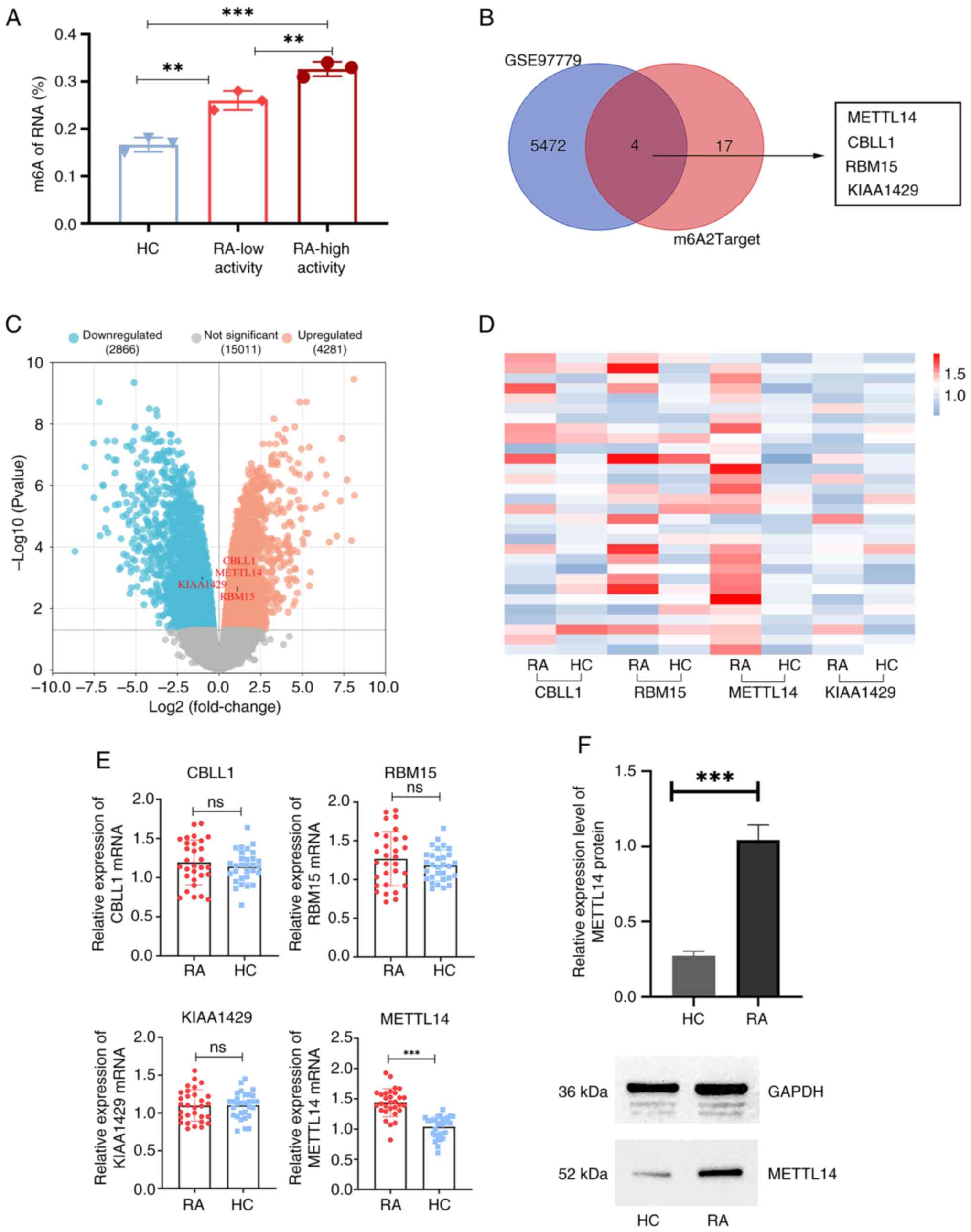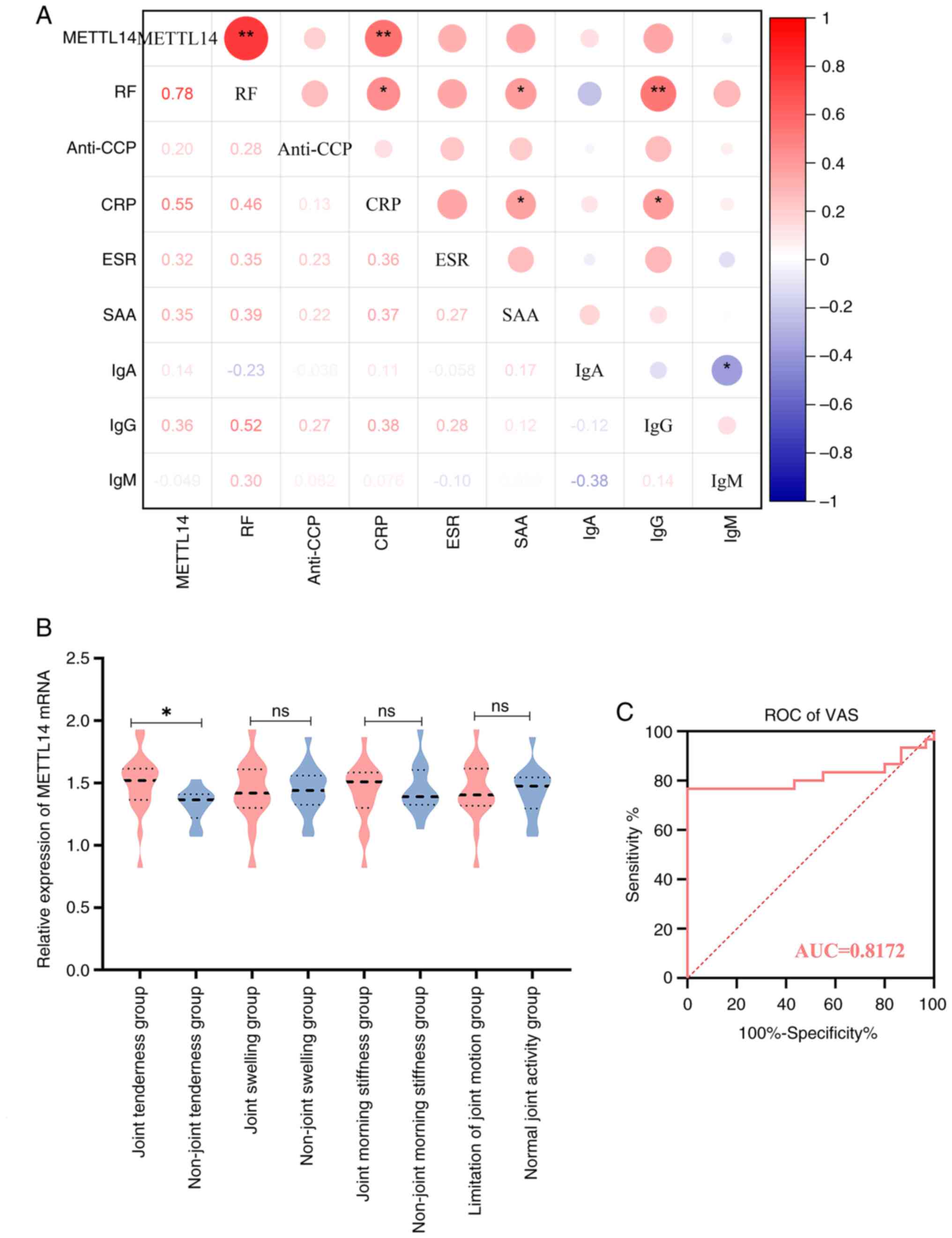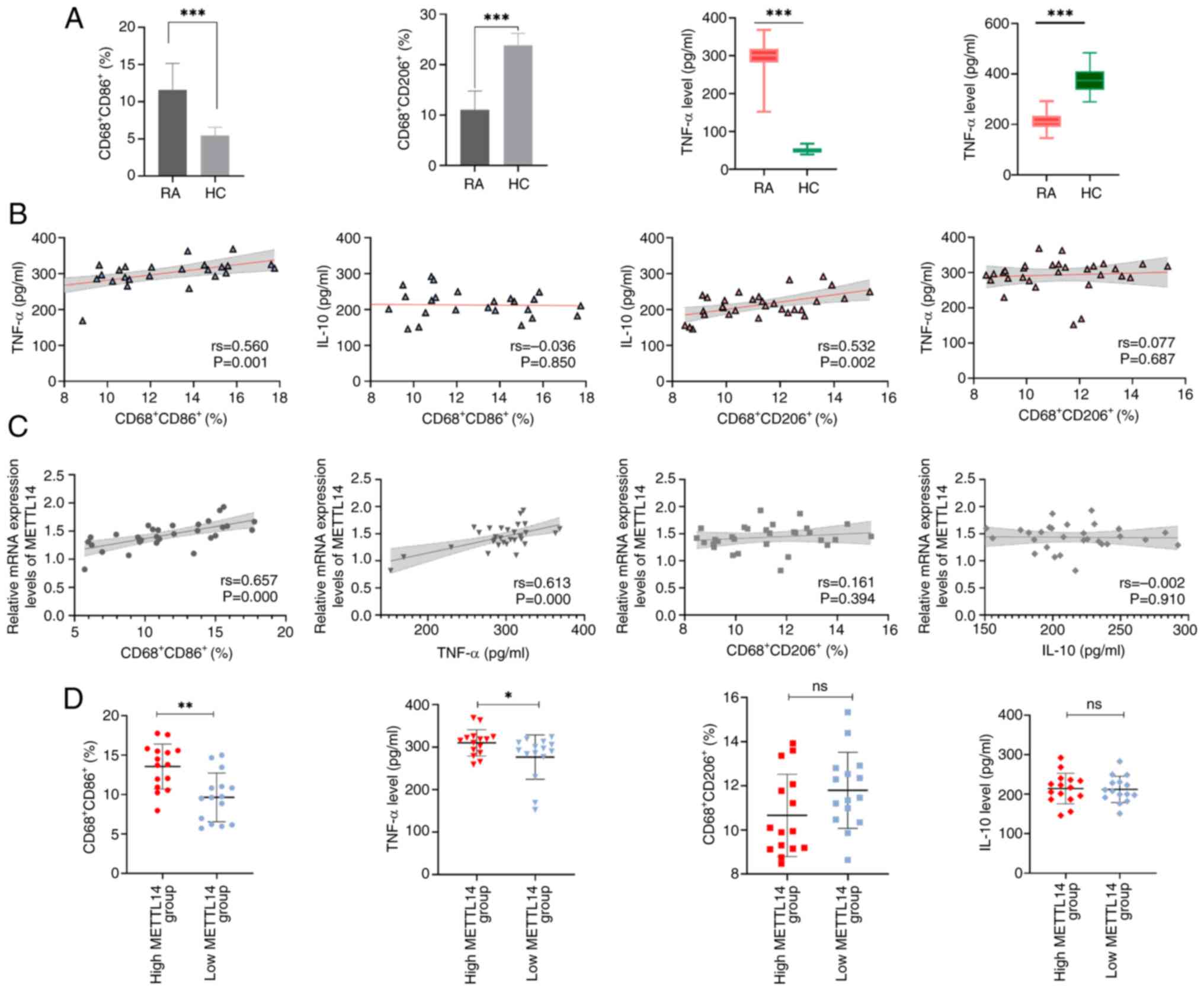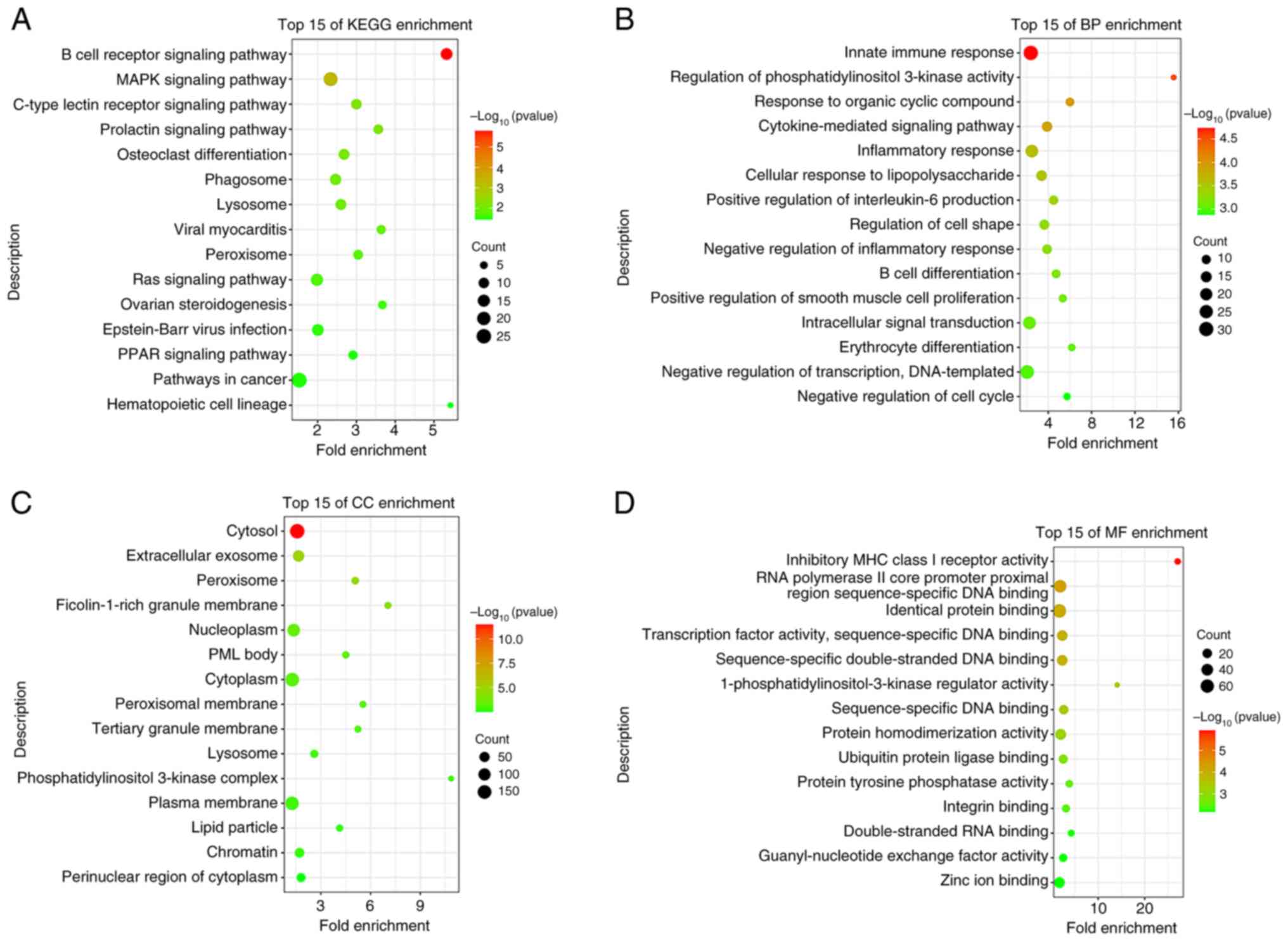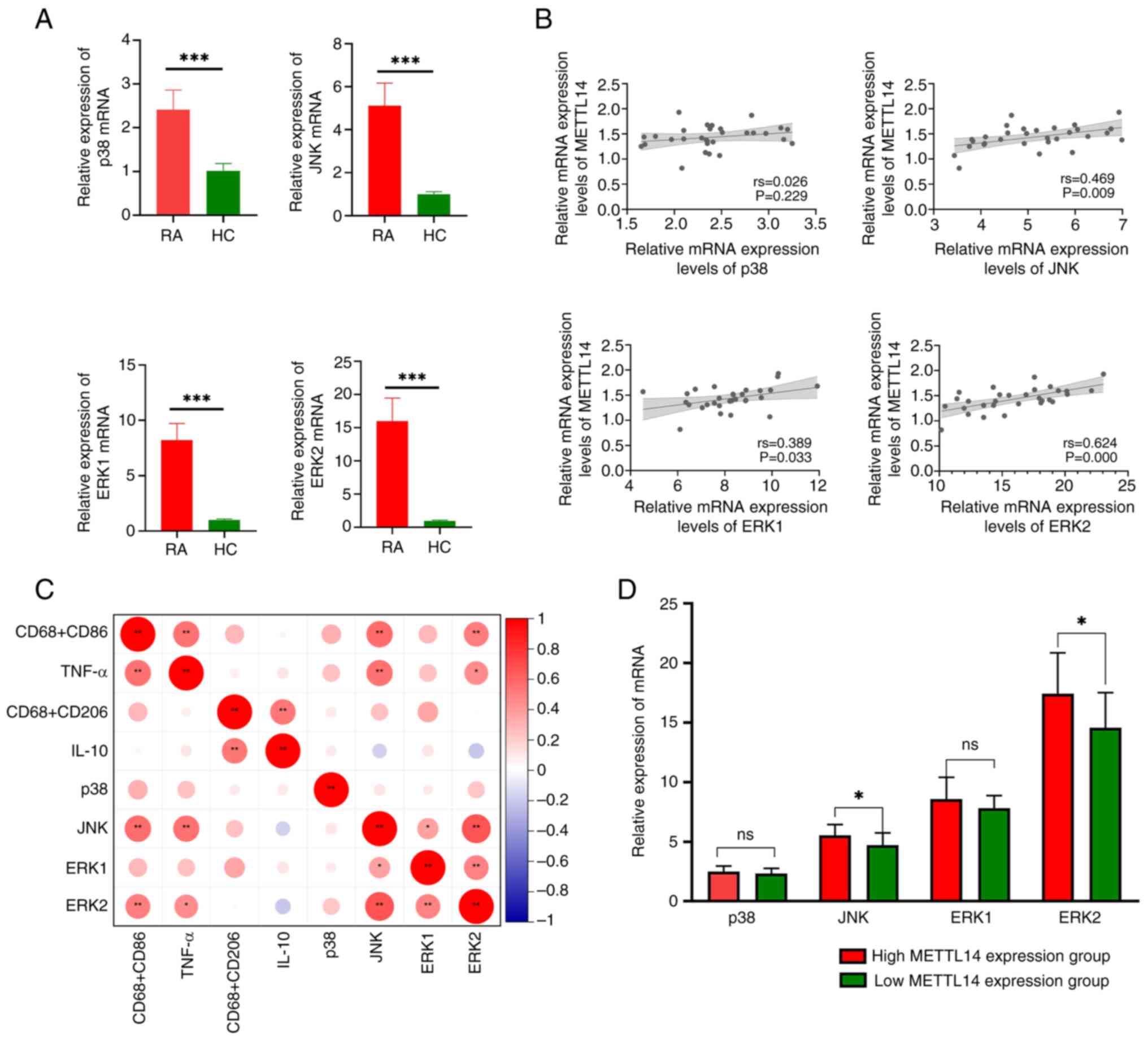|
1
|
Wan L, Liu J, Huang C, Zhu Z, Wang K, Sun
G, Zhu L and Hu Z: Comprehensive analysis and functional
characteristics of differential expression of N6-methyladenosine
methylation modification in the whole transcriptome of rheumatoid
arthritis. Mediators Inflamm. 2022(4766992)2022.PubMed/NCBI View Article : Google Scholar
|
|
2
|
Liu S, Ma H, Zhang H, Deng C and Xin P:
Recent advances on signaling pathways and their inhibitors in
rheumatoid arthritis. Clin Immunol. 230(108793)2021.PubMed/NCBI View Article : Google Scholar
|
|
3
|
Alivernini S, Firestein GS and McInnes IB:
The pathogenesis of rheumatoid arthritis. Immunity. 55:2255–2270.
2022.PubMed/NCBI View Article : Google Scholar
|
|
4
|
Kurowska-Stolarska M and Alivernini S:
Synovial tissue macrophages in joint homeostasis, rheumatoid
arthritis and disease remission. Nat Rev Rheumatol. 18:384–397.
2022.PubMed/NCBI View Article : Google Scholar
|
|
5
|
Jang S, Kwon EJ and Lee JJ: Rheumatoid
arthritis: Pathogenic roles of diverse immune cells. Int J Mol Sci.
23(905)2022.PubMed/NCBI View Article : Google Scholar
|
|
6
|
Jiang P and Li X: Regulatory mechanism of
lncRNAs in M1/M2 macrophages polarization in the diseases of
different etiology. Front Immunol. 13(835932)2022.PubMed/NCBI View Article : Google Scholar
|
|
7
|
Cutolo M, Campitiello R, Gotelli E and
Soldano S: The role of M1/M2 macrophage polarization in rheumatoid
arthritis synovitis. Front Immunol. 13(867260)2022.PubMed/NCBI View Article : Google Scholar
|
|
8
|
Hasegawa T and Ishii M: Pathological
osteoclasts and precursor macrophages in inflammatory arthritis.
Front Immunol. 13(867368)2022.PubMed/NCBI View Article : Google Scholar
|
|
9
|
Gao L and Lu Q: The critical importance of
epigenetics in autoimmune-related skin diseases. Front Med.
17:43–57. 2023.PubMed/NCBI View Article : Google Scholar
|
|
10
|
Nair N, Barton A and Wilson AG:
Cell-specific epigenetic drivers of pathogenesis in rheumatoid
arthritis. Epigenomics. 13:549–560. 2021.PubMed/NCBI View Article : Google Scholar
|
|
11
|
Chen Q, Li H, Liu Y and Zhao M: Epigenetic
regulation of immune and inflammatory responses in rheumatoid
arthritis. Front Immunol. 13(881191)2022.PubMed/NCBI View Article : Google Scholar
|
|
12
|
Jain N, Lord JM and Vogel V:
Mechanoimmunology: Are inflammatory epigenetic states of
macrophages tuned by biophysical factors? APL Bioeng.
6(031502)2022.PubMed/NCBI View Article : Google Scholar
|
|
13
|
Ghiboub M, Koster J, Craggs PD, Li Yim
AYF, Shillings A, Hutchinson S, Bingham RP, Gatfield K, Hageman IL,
Yao G, et al: Modulation of macrophage inflammatory function
through selective inhibition of the epigenetic reader protein
SP140. BMC Biol. 20(182)2022.PubMed/NCBI View Article : Google Scholar
|
|
14
|
Wu S, Li XF, Wu YY, Yin SQ, Huang C and Li
J: N6-methyladenosine and rheumatoid arthritis: A comprehensive
review. Front Immunol. 12(731842)2021.PubMed/NCBI View Article : Google Scholar
|
|
15
|
Gan L, Zhao Y, Fu Y and Chen Q: The
potential role of m6A modifications on immune cells and
immunotherapy. Biomed Pharmacother. 160(114343)2023.PubMed/NCBI View Article : Google Scholar
|
|
16
|
Elsabbagh RA, Rady M, Watzl C, Abou-Aisha
K and Gad MZ: Impact of N6-methyladenosine (m6A)
modification on immunity. Cell Commun Signal.
20(140)2022.PubMed/NCBI View Article : Google Scholar
|
|
17
|
Li C, Zhu M, Wang J, Wu H, Liu Y and Huang
D: Role of m6A modification in immune microenvironment of digestive
system tumors. Biomed Pharmacother. 164(114953)2023.PubMed/NCBI View Article : Google Scholar
|
|
18
|
Geng Q, Cao X, Fan D, Wang Q, Wang X,
Zhang M, Zhao L, Jiao Y, Deng T, Liu H, et al: Potential medicinal
value of N6-methyladenosine in autoimmune diseases and tumours. Br
J Pharmacol: Jun 9, 2023 (Epub ahead of print).
|
|
19
|
Wang Y, Li L, Li J, Zhao B, Huang G, Li X,
Xie Z and Zhou Z: The emerging role of m6A modification in
regulating the immune system and autoimmune diseases. Front Cell
Dev Biol. 9(755691)2021.PubMed/NCBI View Article : Google Scholar
|
|
20
|
Ma Z, Sugimura R and Lui KO: The role of
m6A mRNA modification in normal and malignant hematopoiesis. J
Leukoc Biol. 115:100–115. 2024.PubMed/NCBI View Article : Google Scholar
|
|
21
|
Kang K, Park SH, Chen J, Qiao Y,
Giannopoulou E, Berg K, Hanidu A, Li J, Nabozny G, Kang K, et al:
Interferon-γ represses M2 gene expression in human macrophages by
disassembling enhancers bound by the transcription factor MAF.
Immunity. 47:235–250. 2017.PubMed/NCBI View Article : Google Scholar
|
|
22
|
Kuriya B, Schieir O, Lin D, Xiong J, Pope
J, Boire G, Haraoui B, Thorne JC, Tin D, Hitchon C, et al:
Thresholds for the 28-joint disease activity score (DAS28) using
C-reactive protein are lower compared to DAS28 using erythrocyte
sedimentation rate in early rheumatoid arthritis. Clin Exp
Rheumatol. 35:799–803. 2017.PubMed/NCBI
|
|
23
|
Castrejón I, Chua JR and Pincus T: A
RheuMetric physician checklist to quantitate levels of
inflammation, damage and distress on 0-10 visual analogue scales.
Clin Exp Rheumatol. 35 (Suppl 107):S21–S25. 2017.PubMed/NCBI
|
|
24
|
Livak KJ and Schmittgen TD: Analysis of
relative gene expression data using real-time quantitative PCR and
the 2(-Delta Delta C(T)) method. Methods. 25:402–408.
2001.PubMed/NCBI View Article : Google Scholar
|
|
25
|
Geng Q, Cao X, Fan D, Gu X, Zhang Q, Zhang
M, Wang Z, Deng T and Xiao C: Diagnostic gene signatures and
aberrant pathway activation based on m6A methylation regulators in
rheumatoid arthritis. Front Immunol. 13(1041284)2022.PubMed/NCBI View Article : Google Scholar
|
|
26
|
Zhang X, Li X, Jia H, An G and Ni J: The
m6A methyltransferase METTL3 modifies PGC-1α mRNA
promoting mitochondrial dysfunction and oxLDL-induced inflammation
in monocytes. J Biol Chem. 297(101058)2021.PubMed/NCBI View Article : Google Scholar
|
|
27
|
Saeki N and Imai Y: Crosstalk between
synovial macrophages and fibroblasts in rheumatoid arthritis.
Histol Histopathol. 38:1231–1238. 2023.PubMed/NCBI View Article : Google Scholar
|
|
28
|
Boutet MA, Courties G, Nerviani A, Le Goff
B, Apparailly F, Pitzalis C and Blanchard F: Novel insights into
macrophage diversity in rheumatoid arthritis synovium. Autoimmun
Rev. 20(102758)2021.PubMed/NCBI View Article : Google Scholar
|
|
29
|
Tong J, Flavell RA and Li HB: RNA
m6A modification and its function in diseases. Front
Med. 12:481–489. 2018.PubMed/NCBI View Article : Google Scholar
|
|
30
|
Dou X, Huang L, Xiao Y, Liu C, Li Y, Zhang
X, Yu L, Zhao R, Yang L, Chen C, et al: METTL14 is a chromatin
regulator independent of its RNA N6-methyladenosine
methyltransferase activity. Protein Cell. 14:683–697.
2023.PubMed/NCBI View Article : Google Scholar
|
|
31
|
Li X, Xu X, Zhang Q, Ling M, Li X and Tan
X: METTL14 promotes fibroblast-like synoviocytes activation via the
LASP1/SRC/AKT axis in rheumatoid arthritis. Am J Physiol Cell
Physiol. 324:C1089–C1100. 2023.PubMed/NCBI View Article : Google Scholar
|
|
32
|
Li H, Feng Y, Zheng X, Jia M, Mei Z, Wang
Y, Zhang Z, Zhou M and Li C: M2-type exosomes nanoparticles for
rheumatoid arthritis therapy via macrophage re-polarization. J
Control Release. 341:16–30. 2022.PubMed/NCBI View Article : Google Scholar
|
|
33
|
Song Y, Gao N, Yang Z, Zhang L, Wang Y,
Zhang S and Fan T: Characteristics, polarization and targeted
therapy of mononuclear macrophages in rheumatoid arthritis. Am J
Transl Res. 15:2109–2121. 2023.PubMed/NCBI
|
|
34
|
Gu Q, Yang H and Shi Q: Macrophages and
bone inflammation. J Orthop Translat. 10:86–93. 2017.PubMed/NCBI View Article : Google Scholar
|
|
35
|
Li Y, Zhou Y, Wang Y, Crawford R and Xiao
Y: Synovial macrophages in cartilage destruction and
regeneration-lessons learnt from osteoarthritis and synovial
chondromatosis. Biomed Mater. 17:2021.PubMed/NCBI View Article : Google Scholar
|
|
36
|
Huang X, Wang L, Guo H and Zhang W:
Macrophage membrane-coated nanovesicles for dual-targeted drug
delivery to inhibit tumor and induce macrophage polarization.
Bioact Mater. 23:69–79. 2023.PubMed/NCBI View Article : Google Scholar
|
|
37
|
Zheng Y, Li Y, Ran X, Wang D, Zheng X,
Zhang M, Yu B, Sun Y and Wu J: Mettl14 mediates the inflammatory
response of macrophages in atherosclerosis through the NF-κB/IL-6
signaling pathway. Cell Mol Life Sci. 79(311)2022.PubMed/NCBI View Article : Google Scholar
|
|
38
|
Xie Q, Li Z, Luo X, Wang D, Zhou Y, Zhao
J, Gao S, Yang Y, Fu W, Kong L and Sun T: piRNA-14633 promotes
cervical cancer cell malignancy in a METTL14-dependent m6A RNA
methylation manner. J Transl Med. 20(51)2022.PubMed/NCBI View Article : Google Scholar
|
|
39
|
Li T, Wang T, Jing J and Sun L: Expression
pattern and clinical value of key m6A RNA modification regulators
in abdominal aortic aneurysm. J Inflamm Res. 14:4245–4258.
2021.PubMed/NCBI View Article : Google Scholar
|
|
40
|
Fang Q, Zhou C and Nandakumar KS:
Molecular and cellular pathways contributing to joint damage in
rheumatoid arthritis. Mediators Inflamm.
2020(3830212)2020.PubMed/NCBI View Article : Google Scholar
|
|
41
|
Neamatallah T: Mitogen-activated protein
kinase pathway: A critical regulator in tumor-associated macrophage
polarization. J Microsc Ultrastruct. 7:53–56. 2019.PubMed/NCBI View Article : Google Scholar
|
|
42
|
Hao J, Hu Y, Li Y, Zhou Q and Lv X:
Involvement of JNK signaling in IL4-induced M2 macrophage
polarization. Exp Cell Res. 357:155–162. 2017.PubMed/NCBI View Article : Google Scholar
|
|
43
|
Wang Y, Han CC, Cui D, Li Y, Ma Y and Wei
W: Is macrophage polarization important in rheumatoid arthritis?
Int Immunopharmacol. 50:345–352. 2017.PubMed/NCBI View Article : Google Scholar
|















